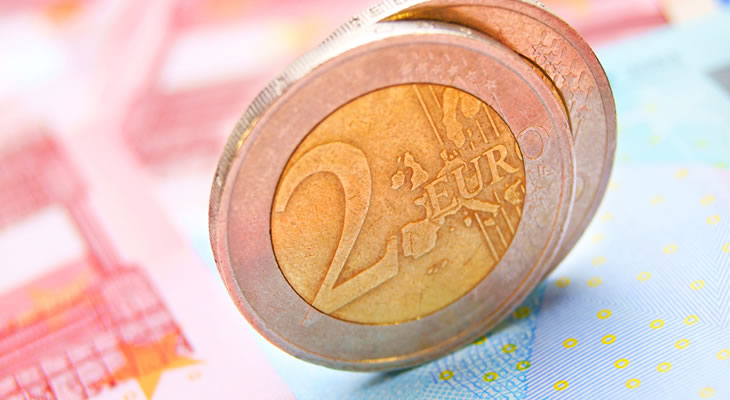The latest GDP figures from the UK have proven resilient to the impact of Brexit, allowing GBP EUR exchange rates to hold on to strong gains. A closer look at the data provided some concerns for investors, however.
Update, Morning, 27th Jan; The latest M3 money supply figure for the Eurozone has further undermined the GBP EUR exchange rate this morning. The M3 money supply is the broadest measure of Euros and Euro-denominated assets in circulation in the currency bloc. Expected to increase 4.9% – a ten basis point uptick on November – M3 instead grew 5%. Higher growth in the money supply suggests more Euros are in circulation, boosting the outlook for inflation as the liquid conditions weaken the purchasing power of the common currency.
Update, Closing, 26th Jan; Does the latest reaction to UK GDP show that the Pound continues to be politically-correlated rather than data-dependent? Theresa May has put her Article 50 bill before Parliament and given MPs just five days to debate it. This could limit the potential for amendments, but it seems investors are just happy to have the end of this period of uncertainty within reach.
Update, Afternoon, 26th Jan; GBP EUR is back in positive territory today. Sentiment has been somewhat buoyed by the fact the UK will have had the fastest growing G7 economy in 2016, assuming other members haven’t exceeded their forecasts.
Update, Midday, 26th Jan; Since the time of publication, GBP EUR has actually slumped into negative territory. Those fears that the service sector growth driving the UK economy forward will begin to falter this year, as Brexit effects make themselves known, continue to undermine the Pound.
UK GDP Strength could Be Eroded as Consumer Spending Slows
It is not an unknown trend for key data UK data to print positively yet the Pound weakens in response. Strong gains against the Euro are quickly edging back once more.
The initial jubilation following the release has quickly worn off as investors break down the data. Once again, the UK services sector was entirely responsible for growth, with ONS Head of GDP Darren Morgan explaining;
‘Strong consumer spending supported the expansion of the dominant services sector and although manufacturing bounced back from a weaker third quarter, both it and construction remained broadly unchanged over the year as a whole.’
Considering the latest retail sales figures (for December) performed significantly worse-than-expected, while inflation continues to rise above target, the outlook for consumer spending is far-from rosy.
This could threaten the UK’s growth in the coming months as the impact of Brexit truly begins to bite, causing jittery investors to sell out of the Pound. This would undermine recent GBP EUR exchange rate gains.
Euro under Threat if Greek Bailout Deal Cannot Be Agreed by February End

Greece and its creditors are currently at somewhat of an impasse regarding a review of the country’s latest bailout. The review needs to be completed in order to unlock the next tranche of bailout funding, but none of the parties involved seems interested in giving any ground.
The key issue remains the target for Greece’s budget surplus, which Eurogroup believes should be 3.5% of GDP by 2018. The International Monetary Fund (IMF) claims this is unachievable and has proposed what it thinks is a more realistic target of 1.5%.
However, the IMF states that lowering the budgetary surplus target could also require the lowering of the Greek income tax threshold and cutting what it calls an ‘extremely generous’ pension scheme.
Greek Prime Minister Alexis Tsipras has vowed not to legislate ‘a single Euro’ more of austerity measures, leaving all three parties in the bailout unwilling to budge.
A new deal needs to be agreed before the end of February. Not only does it unlock the next tranche of funding Greece desperately needs, it also means the matter is agreed before several elections across the Eurozone are held during the course of the year. The Greek bailout is a politically volatile issue, so Eurogroup wants it finalised before opposition parties could get elected and complicate the process.
Therefore, signs of failed progress are going to make investors nervous and could support the GBP EUR exchange rate higher.
GBP EUR Long-term Exchange Rate Forecast; UK CPI and Consumer Confidence Data in Focus
Given the continued dominance of the UK service sector, investors are going to pay particular attention to inflation and consumer confidence data over the coming quarter. Should inflation continue to rise, while confidence weakens, the outlook for this year’s GDP figures may not be quite so solid.
Should the Greek bailout review find an agreeable solution, the Euro may be temporarily supported, but those impending Eurozone elections still pose significant threats to the currency bloc regardless. This may temper overall Euro gains, even if GBP EUR does look likely to fall.
Interbank GBP EUR Exchange Rates
At the time of writing, GBP EUR exchange rates were trending in the region of 1.17, while EUR GBP exchange rates were trending in the region of 0.85.
GBP EUR relative strength indicators were slightly below the neutral 50 level indicating fair value at around 47. This suggests a slight uptick in the Pound could be due in order to take the paring back to fair value.


Comments are closed.